#TO HAVE CENTRAL ASPECTS OF YOUR CHARACTERS AND THEIR PSYCHE
Text
@theimpalpable | the GBEP
Another glance at his front. He can't help it. They hadn't exactly signed up as extra aid to keep watch to this area with the idea they'd be getting fashion tips from random strangers he'd almost threatened to apprehend. To stutter a little through their thought process and reactions seems sensible enough.
Also because he's somewhat starting to doubt he's talking to an actual person. Or... a living one, at least. Which opens the door to a completely different set of problems, which he'd truly rather not step through today.
Or tonight, rather.
Or at any point in time, actually.
Calloused hand flattens the front of his clothes until his fingers curl around the hem of the bland shirt he's wearing under his jacket, lifting it up to stare down at it as though the fabric could materialise a visual representation of the colours just described.
They look up.
What an odd fella. Stiff, somewhat, but not really. Stiff in a way gentlemen are in Western shows, controlled like people of the elite, intellectuals, and superior to the smaller ones who don't have fine shoes, nor can they afford them. At the same time, though, he doesn't... seem... particulary arrogant? That small extra weight to self-importance that would have made assessing him easier.
His tone of voice, too, conversational, if, again, a little... stiff.
Though Seok-ju feels that's not quite the right word.
He blinks, tilts their head.
"I'm... I'll be honest, I'm not quite sure what 'burgundy' and 'hazelwood' look like," a smile breaks out on their lips, like the sun through hazy, stern clouds. Not quite sheepish. Humorous, almost.
"I like my fashion and my style, but... not an expert on the finer details like the actual proper names of colours."
"So," Seok-ju clears their throat, a casual little human error, tick, more than the actual need for it, "when you say replicate... You're a tailor? Or someone from that industry?"
Well, that would explain... wait, that would explain a lot actually. Fine suit, fine demeanour, fine everything. Seok-ju shoves his hands into his back pockets and relaxes with his elbows jutted out, like moments from replicating a mother scolding a silly child.
Although, the naturalism makes him wonder if 'industry' is the right word to apply here.
"Some sort of patrol, yeah," they concede, shifting their weight to rotate the stiffening joints of one of their ankle. Fine manner of speech and apparently very dedicated to his craft, which could both make him terribly innocent or... well... be a very good cover.
"It's nothing too serious, though, you don't have to worry. Nothing dangerous at least," a shrug. A kid missing is always a serious thing, even though too many in the precinct would argue that 19 years don't make a guy a kid, and he's a guy anyway, whatever could possibly happen to him.
Maybe that's why they'd had to volunteer. South Korea and its oh so inclusive laws for missing people.
"Say, you wouldn't happen to have seen a young male-presenting adult most likely wearing a Doosan Bears baseball shirt, beige school uniform trousers, white running shoes and a sports bag?" A tilt of his head to the side again and tragically for himself, the face he makes is doubtful enough that he can't help recognise that some of his fellow officer's thoughts might have begun slipping into their head.
"About this height," lifts his hand to hover, flattened palm facing the ground, an arm width over his head. "Potentially in distress, appearing lost, or unapproachable. Maybe in the company of someone else?"
#theimpalpable#the detective;seokju#SHOUTOUT TO BEYOND EVIL BC I'M STEALING SOME ASPECTS GKLFHJGJLH ABOUT MSISING- sorry rambling~#i don't know why i'm... why am i adding so many details to the---LKGLFJHG feel free to ignore that KLGJFKLHGJKLFH#sorry if there's too much of that in this reply~#BUT HAE-GEON!! I'M BACK FOR YOU HAE-GEON MY WONDERFUL FAVOURITE IMOOGI#oh god i just remembered i know the imoogi from tont HAE-GEON HAS GIVEN ME SUCH BRAINROT FOR HIM#I COMPLETELY FORGOT I KNEW ANOTHER IMOOGI NOW IT'S JUST.- HAE-GEON'S FACE AS THE DEFINITION OF THAT WORD I-#The Alex Effect STILL GOING STRONG!!!!!!!#rereading your tags to your reply and i am SO VIOLENTLY OBSESSED with Hae-Geon's lore and psyche#it's so good YOU WRITE SO GUD- i love this brand of empathy he has this idea of projecting in a way that doesn't sound like#the implication he's forcing his plight as an image onto the essence of others BUT RATHER#he's using what he's been through and perceptions others have shown to have of him to navigate the world in a given way#i don't even know if that's correct or if i'm evne making SENSE BUT BASICALLY#the way Hae-Geon interacts with his 'role' in life iS SO INTERESTING and also EVERYTHING#CAN BE ABOUT HIM??? I WOULD LITERALLY NOT MIND I'D LOVE THAT LET'S TURN THIS THREAD AROUN#AND LET'S MAKE IT ABOUT HIM SOLELY BECAUSE HE'S!!!!!!!!!!!!!!!!!!!!!!!!!!!!!!!!!1#ALEX I DON'T KNOW IF THIS IS/WAS/WILL EVER BE THE CASE BUT PLS KNOW THAT I WOULD ALWAYS ADORE#TO HAVE CENTRAL ASPECTS OF YOUR CHARACTERS AND THEIR PSYCHE#BE CENTRAL ASPECTS OF A THREAD OKAY I WOULD LOVE TO EXPLORE ANY OF THAT IF YOU FEEL LIKE IT#I'D BE HONOURED TO BE INVOLVED IN IT.. I DK IF THIS MAKES SENSE TO SAY HERE KLFHGJJLHKGFH BUT IT CAME TO MIND#AT THAT ONE TAG OF YOURS SO YES ALWAYS-#I ADORE /YOU/ AND /YOUR/ HECKING MUSES THANK YOU FOR WRITING WITH ME
0 notes
Note
Is Zdarksy’s Batman run actually bad, or is it just messy?
I actually like Zdarsky's current Batman run and don't think 'bad' or 'messy' are actually the right words to characterise it at all.
There's a tendency when a writer gets handed one of the Big Name Titles (Batman, Detective Comics, Superman, Action Comics, Tom King's currently attempting it over in Wonder Woman) to want to produce a Genre Defining, Intellectual Run on the the title. I don't entirely blame it on Jeph Loeb and Hush, but it's undoubtedly become a lot more common since Hush sold approximately one squillion copies and has never been out of print since 2003.
Writers want to make their mark on the title and so they get caught up in interrogating Bruce's psyche rather than focusing on writing entertaining stories based in Gotham characters.
(This is also why I suggest if you want a fun Scott Snyder Batman run you read Gates of Gotham or All Star Batman rather than his Batman run, because he's trying less hard to write his Great Batman Graphic Novels and more focused on telling a good story).
At the moment we have both Chip Zdarsky and Ram V focused on writing Great Defining Batman Runs, rather than what is more common to happen, which is one of the writers on Tec or Batman is trying this and the other is focused on writing entertaining Gotham stories. Ram V's is, from all accounts, probably the one of the two that is going to end up entering The Canon.
However I certainly see more people talking about Zdarsky's run, probably because it's the more accessible of the two to pick up casually for for a run.
What ALSO doesn't help is that Ram V. is currently writing a Barbatos-based run and Zdarsky is writing a Zur-En-Arrh-based run (extremely generalised), as they're two overlapping Basic Batman Plots about forces controlling Bruce.
Why I think people are currently complaining about Zdarsky's run:-
It's based around an interrogation of Zur-En-Arrh Batman. ZEA is probably one of the least liked 'Bruce has crossed the line and is trying to be All Batman, All the Time' plots around here, because it revolves around a concept essentially invented by Grant Morrison, and people on tumblr don't like Grant Morrison's Batman.
Zdarsky is writing about Joker. People on tumblr don't like Joker and think he's overused.
Zdarsky's run has leaned quite heavily into multiversal concepts so far, but what he's looking at is different depictions of Batman The Character across different media adaptions, particularly older adaptions, and what they have to say about the central truth of Batman The Character. He's picking blokey and reddit-popular sort of titles to reference, not tumblr-popular ones.
The primary character in the run is Bruce. The secondary character in the run is Tim. Every other Bat character who passes through the run is brought in to serve a purpose to the narrative, using an aspect of their personality, and if you're a fan of another character, the fact that they're appearing as a side character or an obstacle in the story can be annoying, as the story isn't focused on the thing you cherish most about your blorbo.
I think everyone is busy blaming every aspect of the plot of Gotham War they don't like on Zdarsky, despite the fact it was written by a trio: I don't see Tini Howard or Matthew Rosenberg catching nearly as much flack for Gotham War, even as aspects of the event were pretty clearly steered by them (The Selina parts of the plot were obviously Howard. The Jason parts of the plot including the conditioning look pretty clearly to be a Rosenberg requested part of the story, given he had been consistently writing most of the published Jason content for the last 3 years).
Really, I think at its base it's that Zdarsky is digging into an aspect of the Batman mythos that tumblr doesn't particularly like, and that Zdarsky's main focus in terms of characters are Bruce and Tim. It's fashionable to complain that Tim's getting love and support by a writer for a whole lot of fanon rather than canon related reasons, PLUS Zdarsky is using the wider Gotham cast sparingly and only when he specifically wants them to work within the narrative he's telling.
Plus, it's pretty clear to my eye that Zdarsky's favourite Batman eras are about 1995-2009, and that's shaping some of his choices of characterisation using long term aspects of characters. He's a Brubaker-Rucka and a Morrison-Nicieza fan, people. He likes O'Neil era events and Batfamily writing from Gotham Knights and Bruce Wayne: Murderer/Fugitive.
#the book titled 'Batman' is allowed to focus on Batman#to the exclusion of including other characters even#do I enjoy writing that handles a wider cast? of course#but if there is one title in the entirety of DC that can and should be obsessed with Bruce it's freaking Batman
38 notes
·
View notes
Note
I've been wondering if you have any thoughts on the line "A sword is never a killer; it is a tool in the killer's hand" but specifically in the context of tdt ch 18 where ronan says it. I thought it could be a reference to ronan's nightmares and night horrors being a tool for his self-destruction, but would love to hear your thoughts!
hi, thank you for this message (and for waiting)! i'm going to try to stay within the context of tdt ch 18 in my actual answer (so this response won't discuss the phrase as it relates to the gray man [and greenmantle, and niall, and so on] and other overarching themes in the series such as tools vs. weapons, magic/love as tools that can be wielded as such, etc.). as you can probably guess, i'll be mentioning suicide, self-harm, and general depressive/self-loathing thoughts and behaviors, though there are no graphic descriptions of injuries.
i definitely agree that the main reference of this phrase is to how ronan’s night horrors act as a means for self-harm: both physically and physiologically; both in the dreamscape and in the waking world. ronan, the killer; the night horrors, tools in his hands he wields against himself. to me, one of the central themes or questions of chapter 18 to the characters (ronan and gansey) is the true nature of ronan’s suicidal thoughts and behaviors. of course, as a reader, being able to interpret all the literal and metaphorical aspects of the text makes my interpretation of ronan’s words and actions different than gansey and ronan’s interpretations. i think the reason for me mentioning this will become clear later.
i’m not sure how prominent a debate over the truth of ronan’s attempt is (or was) amongst trc readers, but i think there are two main possible interpretations (although i think the distinction between the two is not very important in the end, given how metaphors are used in tandem with the mundane in the series). a debate, if one existed, would investigate whether a subconscious urge to harm oneself is equivalent to a realized/intentional one and different thoughts on interpreting certain magic metaphors in trc. i think a distinction between subconscious and conscious suicidality (i.e. decoupling his waking desires from his subconscious impulses and assuming suicide would require conscious intention; assuming that ronan did not kill himself but was rather attacked) is possible and would make more sense in a conversation about lived experiences of real people (dream magic put far aside of course) but in trc, especially in the case of ronan, who regularly manifests aspects of his psyche in other objects and beings, we can take them as more similar or even the same experiences in this very specific case. in other words, i prefer to holistically evaluate ronan’s suicide attempt via night horror as both symbolic and literal given that he is the source from which the horrors are generated and that they have a singular lust for only his blood. in my opinion, this interpretation is more consistent with the symbolism and themes of ronan’s dreams as a larger category, inclusive of the night horrors.
in chapter 18, we learn that ronan has allowed people (including close friends, like gansey) to believe he attempted suicide by mundane means several months prior to avoid disclosing the secret of his dreaming/that his injuries were inflicted by dreamt night horrors. i’ll talk a bit about the implications this revelation has for ronan’s relationships with niall, gansey, and lies/secrets/truths, but first, i’ll emphasize that there is a strongly blurred distinction between killer and tool when said tool springs from the killer’s own mind. i think this opens up an interesting avenue of discussion of a more general philosophy regarding ronan’s dreaming, his responsibility over himself versus his dreams (particularly the living dreams), to what degree would/should it possible to separate his dream’s volitions from his own, and does the answer change for dreams that act as extensions of other aspects of his subconscious, the dreams that materialize his care or love or innocence or fear instead of his self-destructive tendencies, born of grief? and how does this change in situations when ronan is repressed, isolated, confused (e.g. the specific point in ronan’s development currently being discussed)? when ronan has been raised to never disclose his dreaming, cannot choose the content of his dreams, and has not been explicitly taught that he can choose what to bring back?
in chapter 18, ronan makes this confession to gansey after waking from the mask nightmare, which results in the manifestation of night horrors in addition to the mask bearing adam’s (ronan’s? ronan’s adam’s?) blood. the scene, once gansey finds ronan, starts with his back turned, “wicked” tattoo on display, body tense and guarded. we’re reading from gansey’s pov, so the limited access to ronan’s internal experience adds to the mysterious and tense atmosphere- for a moment, ronan is someone alien, strange, unfamiliar to gansey. crucially, ronan addresses gansey in latin: quemadmodum gladius neminem occidit; occidentis telum est. it feels like an avoidance of the truth, of what he’s about to disclose, given the lack of eye contact and, maybe moreso, gansey’s inferior grasp of latin. when ronan does turn to face gansey, he resurrects their collective memory of a promise: that ronan told gansey ‘it would never happen again.’ gansey interprets, as anyone with his incomplete vantage point would, this as a promise to not attempt suicide again, but ronan clarifies that he has technically broken his word by dreaming more night horrors (as, apparently, the promise was to not let himself get attacked by them again rather than to not attempt suicide again- but as i’ve said, i think the distinction is due to ronan’s a. still-developing sense and command of self, dreaming, subconscious urges, etc. and b. aversion to lying). ronan tells gansey it’s not like that- but it kind of is. perhaps the difference this time is that his manifestation of the night horrors is less steeped in grief at the loss of his father and more characterized by his feelings for adam and difficulty accepting them, but that’s not something prominently explored in this chapter (because of all the repression, of course).
another difference, far more immediately crucial, is that this time, he no longer keeps the dreaming secret, and this evolution from silence to confession saves them both. ronan has gansey to literally help fight his demons (notably, kavinsky has no one, in the end). it is ronan’s choice and ronan’s choice alone to find the will to live, to break down his self-hatred, but it is his relationships that foster an environment in which that’s possible (the most relevant examples to this current topic are gansey helping him kill the night horror in monmouth and adam repairing the ley line during the battle with kavinsky at the end of the book). ronan’s night horrors are killable, defeatable; his suicidality is not perpetual nor insurmountable. kavinsky’s dragon, by comparison, seems invulnerable, or at least exponentially more difficult to kill, especially without the benefit of implicit, durable love on his side. i think it’s also notable that kavinsky knew the truth of ronan’s suicide attempt from the start, but this theoretical and experiential understanding from another dreamer doesn’t save ronan- ronan has to willingly give up the secret. i think this feature of tdt argues that the truth means a lot less when it is stolen.
to return to niall for a bit, i think the chapter (as well as the one that precedes it, which begins with the proclamation: the mask was his father’s) provides some commentary on the consequences of keeping secrets vs confessing truth. niall commands ronan to never confess about the dreaming, so ronan uses a more literal suicide as a cover story. the secrecy and lie ronan carries on top of the self-destructive tendencies, the self-hatred, etc. are additionally heavy burdens for him to carry. trium @grandfather-clock made this absolutely brilliant observation that i've paraphrased a bit: that this secrecy about dreaming fosters ronan’s sense of shame, which extends to secrets beyond dreaming, and that this shame is a perverting force: it makes niall’s (probably) harmless mask hanging in the barns a legitimate danger in ronan’s dream; it makes adam/ronan's love for him, ronan’s second secret, a monstrous nightmare that reflects ronan’s perception of himself as a shameful, corrupting force. (i will venture so far as to posit that the dark night horrors, ronan's self-hatred, are a perversion of ronan's capacity to love himself and others: the two-headed night horror he can only dream at the end of tdt.)
ronan’s technical betrayal of niall is notable- even though gansey and the others already know about the dreaming; he discloses that dreaming nearly allowed him to kill himself (and being a dreamer likely contributed to his depression in the first place, making the loss of his father and subsequent isolation even more sharply felt). he makes this confession, however guarded, to gansey: someone who so fiercely strives to maintain ronan’s safety.
but i will confess that even though i have my own interpretation, ronan’s own belief about his suicide attempt is a little slippery to me. I will say that quemadmodum gladius neminem occidit; occidentis telum est. is a seneca quote, and in context, it is referencing other men's arguments and not necessarily the author’s (seneca's) personal beliefs. does ronan agree with the claim, that the guilt lies with killer rather than the means of killing? is he admitting the lie to gansey while also admitting he DID kill himself, just not in the way gansey thought? was the lie about methodology and circumstance rather than true intention and feeling? or is he saying he doesn't believe that a sword is just a tool in the killer's hand, and that the night horrors have motives and thirst for his blood beyond what he feels and wants, and he is using the cover of someone else’s philosophy to make a difficult admission? regardless, even though ronan’s feelings toward the seneca quote are ambiguous to me (and i am quite doubtful that this particular context surrounding the quote was considered when this chapter was written), i think the intention of truth, honesty, and therefore trust constitute the most important part of the chapter, and that ronan does in fact believe what he is saying.
at the end of the chapter, there’s some established clarity and revelation about ronan and his dreaming/near-death for gansey.. it takes the entirety of the scene in which they fight and kill the night horror for gansey to translate and recognize the quote, and ronan says it again, this time in english, this time with his face visible to gansey: A sword is never a killer; it is a tool in the killer's hand. it feels like a deeper iteration of the confession. but does ronan believe what he’s saying, and what does it mean to him? i think it’s his way of telling gansey he really was harboring suicidal ideation, even if only in dreams (although his reckless behavior while awake suggests otherwise) and that the confession of the dreamt/magical aspect of the suicide has been made earlier, so he now makes the confession that said dreamt/magical aspect was a sword he forged to only harm himself. gansey doesn’t know this (and wouldn’t, since the night horror even claws him, not ronan during the scuffle, although i think it’s meant to immobilize gansey rather than kill him), but the night horrors only ever want to hurt ronan. they are said to be in love with his blood - a perversion of lynch arrogance! and also a fascinating avenue i’ve yet to explore given the fact that he dreams adam’s (?) blood and the nightmarish form of adam is described as a night horror himself in the previous chapter.
ronan also repeats the line at the climax of the book (first told to him by cabeswater’s trees in latin, he then repeats it aloud in english). i won’t discuss it much here since you’ve asked about chapter 18 specifically, but i will say the following: the book states that the night horrors were not a weapon ronan could wield; he laments that he cannot control them and that they only want to hurt him. this sort of convolutes the conclusion i made at the end of chapter 18- now it seems like ronan sees a greater distinction between himself and the night horrors, which makes sense, since he is on the cusp of realizing he no longer hates himself, but the declaration that he can’t control them implies that he also had no control over his suicidality, which, now that i’m typing this, does make sense, but doesn’t necessarily lessen the link between his subconscious urges and material outcomes and truth of what happened. i think it’s interesting that ronan does not consider the night horrors weapons because he can’t use them to harm anyone (and this is in the context of not being able to use them in combat against kavinsky). it’s as if he’s robbing himself of personhood by declaring that harming himself with a tool does not make the tool a weapon, and it only would be a weapon if wielded against someone else. much to think about as i oscillate between the chapters. i think there is an obvious gap between ronan as a character and myself as a reader, and this distance is making my observations a bit muddled/subject to change as i re-read the scenes since i am constantly evaluating ronan’s perspective against the broader literary implications of his character.
i’ll sort of summarize all of this by saying i'm of the strong opinion that because ronan's dreams (especially at this point in his development when he has little control over his dreaming and is particularly at the whims/mercy of his subconscious) are not strictly him but are aspects so clearly derived from his own thoughts and feelings and desires and perceptions (the night horrors make ticking noises, maybe like hearts?), he did intentionally kill himself, even if the exact mechanism and thought process was obscured (even from himself) by the magic of it. so perhaps the night horrors are tools of expression (of grief, of self-hatred, of repression, of depression) rather than universal weapons, but become weapons against only ronan in his (the killer’s) hands. what do you think?
#rchl#ask#trc#the dream thieves#ronan lynch#suicide mention#thanks trium for making sure this all made sense <3
36 notes
·
View notes
Photo


Silent Hill 1: Or how I learned to stop being scared and love terror. “The fear for blood tends to create fear of flesh” Silent Hill is one of the references in terms of horror in video games, it is unquestionable, but I cannot remember another game that has made me think as much as this one did, that is, in theory it is a fairly simple game, even being such an old game you'd think it wouldn't be so scary I mean I can see the pixels that can't scare me but I think silent hill finds strength in its weaknesses the fact that the ps1 couldn't render a city forced them to think outside the box from the box and reach the iconic fog that generates a lot of uncertainty, since the only thing you can guide yourself with is the sound of your radio to be safe. And despite being such an old and simple game, technically speaking it doesn't show its weak points, it really shows that the team behind this game really had a special affection for it, because it almost never plays it safe creatively, the music is iconic already by the fabulous Akira Yamaoka as well as Masajiro Ito's creature design. It really is a feat that in a genre where you usually rely too much on gore and jump scares here the horror is based on making you feel alienated in a hostile world, this is probably the coldest and most cryptic game I've ever played, but that's part of its design It's part of the psychological terror it wants to make you feel, plus I'd also give it extra points for the quality of the puzzles in the game, they really do require a pretty decent puzzle-solving ability. As for the story, I think it supports a lot of the cryptic and lonely aspect of the atmosphere, so you don't have too much character development; however, when the game wants to make you feel other emotions such as empathy, sadness or nostalgia, it will succeed. Personally, I think that in terms of its central theme, Silent Hill was way ahead of its time, this is already more of a head canon, but I think the theme is a social commentary on how society and especially religions and cults have abused women throughout history, using them as means to an end, as can be seen in the case of Alessa, who kept her alive for the only thing they kept her alive was to conceive despite only being a girl or there is also the case of Lisa Garland who was drugged, abused and physically and psychologically injured by Dr. Aickmann and the cult for god knows how long, to the point of literally losing her humanity and ending in one of the saddest death scenes possible, even To support my theory, we would only have to see the final boss of the game "Incubus" which is defined as: "Incubus is the one that responds to the male gender and likes to possess women during dreams to be able to generate them and thus have offspring." Supporting the aforementioned how Alessa was only kept alive to procreate. In addition, the use of symbolism and occult objects is fascinating and somewhat fresh theme in the genre up to that moment, as well as being able to discover the psyche of a disturbed girl in a physical way as a place that could be every day, but seen from the perspective of a girl who has been abused in many ways is very interesting and creates empathy for this type of case, as if all the sins were mixed and effervescent with the facade of a city. However, it is not exempt from criticism, especially in the gameplay it is archaic and often difficult to control. Above all, it is a game that despite its flaws is mandatory and a masterpiece in the genre. Good night and Happy Halloween.
#silent hill#Silent Hill fanart#konami#Fanart#fanart drawing#survival horror#survival horror videogames#silenthill#harry mason
12 notes
·
View notes
Text
Chihayafuru is Masterful!
Well I recently got myself to watch Chihayafuru. It had been on my radar for a long time and someone close to me nagged me about it because I love sports anime but to be honest, it didn’t catch my eye because I wasn’t sure if I could relate to the sport of Karuta. I had heard of the amazing reviews but to be honest, it was hard for me to bring myself to watch it. Also the fact that it was so revered in the anime community also made me hesitant to watch it until I could be full appreciative of it by being in the correct mindset. In hindsight, this was not as big a deal as I made it out to be. For example, I enjoyed several baseball anime before I even properly understood the rule of baseball. In fact, I came to appreciate baseball because I enjoyed baseball anime and the suspense and variety of plays in the depiction of the game. But still, baseball was still closer to other sports I played and watched for years so I am sure some of my caution was warranted. Nonetheless, it is funny how perfect of a time I chanced upon to pick up Chihayafuru. I was doing my gazillionth rewatch of the Adachi classic “Cross game” and was out of ideas as to what to watch next. I was in the mood of sports anime but didn’t want to watch some shonen-ish super intense sports anime. Also character work ftw. And while browsing and looking for something to watch, I chanced upon it and I was like sure, I can watch a couple of episodes and delve into it while eating my bibimbap before I continue with my all nighter to finish up some pending work. And so began a series of unfortunate events, in the sense that I wouldn’t be able to begin my planned work on my pending project until three days later. The timing was impeccable, almost like providence, in that the manga had just finished a week ago, something I had no awareness off. And so I binged through 2.5 seasons of 62 episodes in less than 13 hours (if you don’t know - I watch anime at 1.8x) which is one of my fastest binge runs in the recent time. And finishing up the three seasons, I immediately jumped into the manga, continued my speed-run until I was at the last page of chapter 247. What a ride.
I would probably do a couple of posts on the thematic nuances, character-work and just the literary brilliance of the series, since it is impossible to cover the vast depth that this series has in one post. However, one aspect of the series that I would cover here, to some degree, is the Hyakunin Isshu - the 100 poems, historically compiled and preserved through Nippon history. Think of it like Heike monogatari which was one of the oldest monogataris that still continues to inspire media tremendously; a new anime adaptation came out in fall 2021, which was also very grandiose with beautiful animation. Nonetheless, it is just amazing how 4 line poems written a millenium ago can hit deeply into your emotional psyche.
kaze wo itami, iwa utsu nami no, onore nomi, kudakete mono wo, omou koro kana" - Loosely translates to "As the wind is strong, waves hit the rocks, yet only I am shattered when I think of you."
While Karuta is the central plot device to move the story, the Hyakunin Isshu - the 100 poems are subtly the main drivers of the story. This becomes much more apparent when each of the poems wonderfully encompasses the story of each of the characters and their struggles. Minamoto No Shigeyuki's poem above is a wonderful demonstration to juxtapose the development of one of the best-written characters, Mashima Taichi. The similarity to Rei Kiriyama is frighteningly heavy. Both Mashima and Rei hate their respective fields but feel that they have to play on as it is the only thing they do have. Nonetheless the difference here is that while Rei Kiriyama is relatively a genius like Arata in the story, Taichi isn't unless he is. He is not born with the game sense to play the game and just hangs on with his meticulous hard work. He is a jack of all trades but doesn't have something he is really good at. The imposter syndrome is real and very relatable. And so he expresses all his feelings through Karuta, something he doesn't enjoy (or does he). As Chihaya herself realizes, he is like the waves that hit the rocks in vain,
"Tare o ka mo, Shiru hito ni sen, Takasago no, Matsu mo mukashi no, Tomo nara naku ni" - loosely translating to "GONE are my old familiar friends, The men I used to know; Yet still on Takasago beach,The same old pine trees-grow, That I knew long ago."
The story is a development of childhood friends who grew together, grew apart, grew separate, yet were still connected by the thread of Karuta. They get seaparated by distance, separated in Karuta, separated by their love for themselves, separated by their love for Karuta, but as long as they keep playing Karuta, they find their way to each other. The old familiar self they knew are gone, yet the same old pine trees grow that they have known all this time, ever since.
"Tachiwakare inaba, Inaba no yama no mine ni ouru matsu; matsu to shi kikaba ima kaerikon" translating to "We separate if I leave, just like the name of the pine trees that grow on the peak of Mt Inaba, if I hear that you are waiting for me, I will return to you".
Would anyone believe that this poem and the previous one were written in different times by different people? Well the human emotions and depth of conversation with oneself has probably been the same throughout history. You can grow apart from people, by fate or by choice but truthfully if the bond you had with someone was special to you, even if you can't be true to yourself, somewhere deep inside you know that if they call out for you, you will always reach out to them. This beautifully complements both the overall narrative and final act of the story which I would leave the reader to figure out the connection without spoiling. This poem called Tachi, alluding to Mashima Taichi's name cleverly complements the Tare poem above.
However, despite the connection between Tare and Tachi, the true literary complement for Tachi is another unrelated poem from the Hyakanin Isshu.
"Chihayaburu, kami-yo mo kikazu, Tatsuta-gawa, kara-kurenai ni, mizu kukuru to wa" - translating to "Even in the age of almighty gods unheard of, − the waters of Tatsuta are tie-dyed in crimson.". The poem is named Chihayaburu, or alternatively read as "Chihayafuru". Coincidence much?
P.S. The last line of Chihayaburu's original reading is mizu kukuru to wa which refers to a beautiful autumn scenery like the gale in Chihaya. However, Fujiwara No Teika, the original compiler of the Hyakunin Isshu read it as mizu kuguru to wa changing the meaning of the poem ever so slightly
"Even in the age of almighty gods unheard of, − the waters of Tatsuta are flowing under layers of crimson."
making it a well-disguised love poem, referencing undying passionate love, which is always concealed, providing a beautiful thematic background to the story in question.
1 note
·
View note
Text
Unveiling the Darkness of Man (2024): Exploring Humanity’s Shadow
In the realm of cinematic experiences, certain films transcend the screen, leaving an indelible mark on our minds and souls. Darkness of Man (2024) stands tall in this regard, offering a profound journey into the depths of human nature. In this blog post, we delve into the darkness that this film explores, providing insights, reviews, FAQs, and more.
Exploring the Darkness: A Synopsis
Darkness of Man (2024), directed by visionary filmmaker [Director’s Name], casts a penetrating gaze into the shadows that lurk within the human psyche. Set against the backdrop of [brief description of the setting], the film follows the journey of [main character(s)] as they confront their own inner demons amidst a world veiled in darkness.
Reviews: What Critics are Saying
Critics have hailed Darkness of Man (2024) as a cinematic masterpiece that grips audiences from start to finish. [Insert quote from a reputable critic or publication praising the film’s depth, performances, and direction.] With its haunting visuals, gripping narrative, and stellar performances, this film has left critics in awe, earning it [mention any awards or accolades it has received].
FAQ: Answering Your Burning Questions
What is the central theme of Darkness of Man (2024)?
Darkness of Man (2024) delves into the darker aspects of human nature, exploring themes of [mention themes such as morality, redemption, existentialism, etc.].
Is Darkness of Man (2024) suitable for all audiences?
While the film offers profound insights, it contains mature themes and scenes that may not be suitable for younger viewers. Viewer discretion is advised.
Who are the main actors in Darkness of Man (2024)?
The film features an ensemble cast including [list main actors and their respective roles].
Where can I watch Darkness of Man (2024)?
Darkness of Man (2024) is available for streaming on watch Darkness of Man Online or can be viewed in select theaters.
What makes Darkness of Man (2024) stand out from other films in its genre?
Unlike conventional narratives, Darkness of Man (2024) doesn’t shy away from exploring the complexities of human nature in its rawest form. Its unflinching portrayal of darkness sets it apart, leaving a lasting impact on viewers.
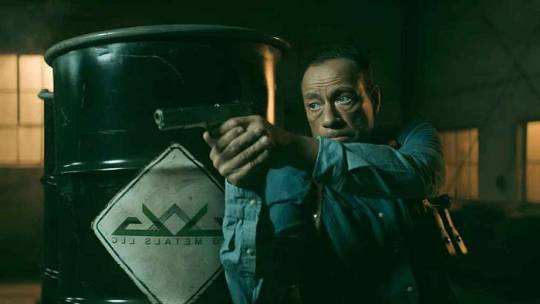
Experience the chilling allure of Darkness of Man (2024) with its captivating trailer:
https://cdn.embedly.com/widgets/media.html?src=https%3A%2F%2Fwww.youtube.com%2Fembed%2FpVepVgt0Q9A%3Ffeature%3Doembed&display_name=YouTube&url=https%3A%2F%2Fwww.youtube.com%2Fwatch%3Fv%3DpVepVgt0Q9A&image=https%3A%2F%2Fi.ytimg.com%2Fvi%2FpVepVgt0Q9A%2Fhqdefault.jpg&key=a19fcc184b9711e1b4764040d3dc5c07&type=text%2Fhtml&schema=youtubeExperience the chilling allure of Darkness of Man (2024) with its captivating trailer
In Conclusion: Embracing the Shadows
Darkness of Man (2024) isn’t just a film; it’s a visceral journey into the depths of our collective consciousness. As we confront the darkness within, we emerge enlightened, understanding that light can only exist in contrast to the shadows. Prepare to embark on an unforgettable odyssey into the heart of humanity’s shadow.
Whether you’re a cinephile seeking profound narratives or a casual viewer in search of thought-provoking cinema, Darkness of Man (2024) promises an experience unlike any other. Dive into the darkness, and let it illuminate your soul.
0 notes
Text
Deciphering Code Name Eden: A Thrilling Tale of Redemption and Revelation
In apocalyptic fiction, few works captivate and intrigue as profoundly as Wenli Yang's "Code Name Eden: The Apocalypse That She Wrote." This riveting novel takes readers on a journey through the depths of human emotion, the complexities of morality, and the enduring power of redemption in the face of impending doom.
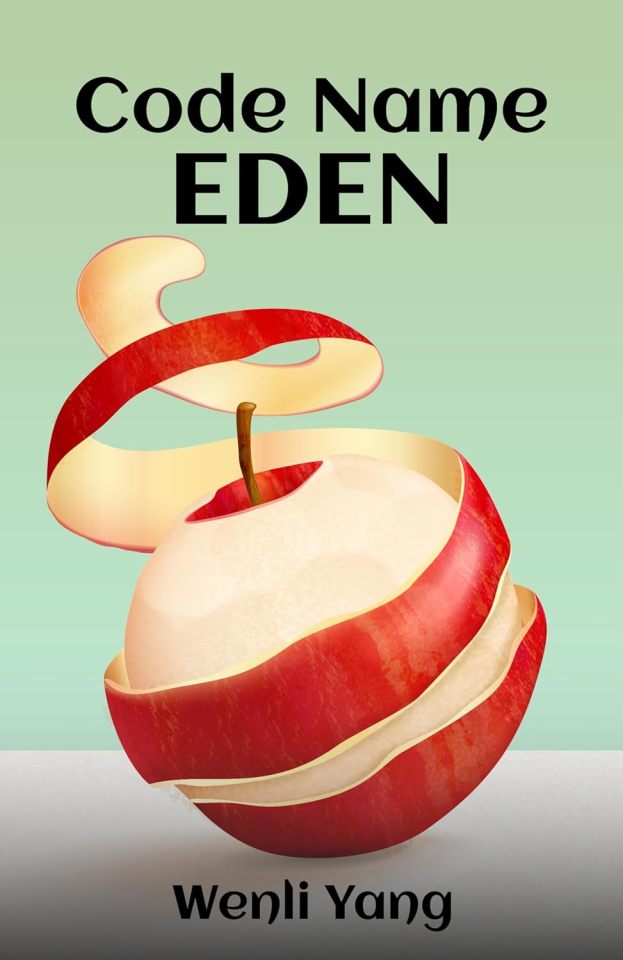
At its core, "Code Name Eden" is a story of survival and salvation in a world on the brink of collapse. Set against the backdrop of a dystopian future, the narrative follows the enigmatic protagonist, Maeve Li, as she navigates the treacherous landscape of a society teetering on the edge of oblivion. Tasked with a difficult mission by Cain, the son of Adam himself, Maeve embarks on a quest to secure a new existence carrier amid the chaos and devastation of an impending apocalypse.
One of the most striking aspects of "Code Name Eden" is its richly imagined world-building and atmospheric prose. From the crumbling ruins of civilization to the desolate landscapes of a world ravaged by cataclysmic events, Wenli Yang paints a vivid portrait of a society on the brink of collapse, where hope is a scarce commodity and survival is a constant struggle. Through evocative descriptions and immersive storytelling, readers are transported to a dystopian future where every decision carries weight and every action has consequences.
Central to the narrative is the character of Maeve Li, whose journey serves as the novel's emotional heart. As Maeve grapples with her inner demons and confronts the moral complexities of her mission, readers are drawn into a world of intrigue, betrayal, and redemption. Maeve's eyes witness the unfolding drama of a world in turmoil, where alliances shift, loyalties are tested, and the line between right and wrong is often blurred beyond recognition.
Yet, amidst the chaos and uncertainty, "Code Name Eden" offers profound insight and revelation. As Maeve delves deeper into the mysteries surrounding her mission, she uncovers startling truths about the nature of existence, the legacy of humanity, and the possibility of redemption in the face of overwhelming odds. Through twists and turns that keep readers on the edge of their seats, Wenli Yang masterfully crafts a narrative that is equal parts thought-provoking and pulse-pounding.
Another compelling aspect of "Code Name Eden" is its exploration of themes such as identity, values, and the spirit of control. As Maeve grapples with her sense of purpose and wrestles with the consequences of her actions, readers are invited to contemplate the deeper questions of what it means to be human in a world where the rules of society have all but vanished. Through its richly drawn characters and morally ambiguous dilemmas, the novel challenges readers to confront their beliefs and assumptions about right and wrong, good and evil, and the true nature of redemption.
Ultimately, "Code Name Eden" is a testament to the enduring power of storytelling to illuminate the darkest corners of the human psyche and to inspire hope in even the most dire of circumstances. Through its gripping narrative, richly drawn characters, and thought-provoking themes, Wenli Yang's novel offers readers a thrilling and unforgettable journey into the heart of the apocalypse.
In conclusion, Immerse yourself in the riveting world of "Code Name Eden" and uncover the secrets hidden within its pages. With its spellbinding narrative, vivid language, and intricately crafted setting, this novel is a true masterpiece that will grab your vision and keep you on the edge of your seat from beginning to end. Don't miss the chance to experience the thrill of this unforgettable tale of redemption and revelation.
1 note
·
View note
Text
Pandora Hearts Month 2022 Prompts!
We have our prompts for Pandora Hearts Month 2022! Thank you to everyone who voted!! 😘
Pandora Hearts Month is an event that celebrates Pandora Hearts. The first three weeks celebrate the three main trios (Golden Trio, Rainsworth Trio, and Tragedy Trio) and the fourth is a bonus week that celebrates any ships/friendships/ot3 fans chose and love. You can create edits, fanart, drabbles, fanfictions, amvs and mms.
Please remember to tag this blog @phmonth2022, and/or me @i-prefer-the-term-antihero in your posts to make sure I reblog them!!
Don't forget to either put a link, or a “read more” on long fics (or long posts in general), so it’s easier to reblog!
I also made a collection on Ao3 for writers! Don't hesitate to add your fics to it!
Lastly, don’t forget to join our discord if you haven’t! It’s a fun place to discuss the series and more easily share your creations!
Without further ado, here are the prompts!
Golden Trio Week (Alice, Oz and Gilbert), May 15th—21st:
Day 1, Sunday May 15th: Pink
Day 2, Monday May 16th: Daffodil
Day 3, Tuesday May 17th: Queen
Day 4, Wednesday May 18th: Summer
Day 5, Thursday May 19th: Cage
Day 6, Friday May 20th: Ocean
Day 7, Saturday May 21st: Garden
Rainsworth Trio Week (Sharon, Break and Reim), May 22nd—28th:
Day 1, Sunday May 22nd: Purple
Day 2, Monday May 23rd: Forest
Day 3, Tuesday May 24th: Sister
Day 4, Wednesday May 25th: Madness
Day 5, Thursday May 26th: Cake
Day 6, Friday May 27th: AU
Day 7, Saturday 28th: Whisper
Tragedy Trio Week (Lacie, Jack and Oswald), May 29th—June 4th:
Day 1, Sunday 29th: Storm
Day 2, Monday 30th: Sibling
Day 3, Tuesday 31st: Secret
Day 4, Wednesday June 1st: Indescribable horrors
Day 5, Thursday June 2nd: Unimaginable Wonders
Day 6, Friday June 3rd: Tower
Day 7, Saturday June 4th: Snow
Fan’s choice Week, June 5th—11th:
Day 1, Sunday June 5th: Perspective and/or Ivory
Day 2, Monday June 6th: Lilies
Day 3, Tuesday June 7th: Psyche
Day 4, Wednesday June 8th: Wrath
Day 5, Thursday June 9th: Tarnished
Day 6, Friday June 10th: Metamorphosis
Day 7, Saturday June 11th: Sketch
You are free to have fun with this!! As long as you tag it, NSFW is allowed! (Tagging ships is nice too). You can pretty much do whatever you want with the prompts!!
For the trio weeks, as long as you make sure the characters from the trio are your main focus, it’s okay to use other characters in your creations too!! For the fourth week, you can really write about any character you want. It doesn't have to be ships!!
You can join any time, and use as many or as few prompts as you want!! And you don't have to post on the day if you can’t make it!! I’ll reblog things late!!
Since we live across the world, you are free to post whenever the day is for you. I myself will be making posts according to my time, which is Central Standard Time in America.
About the prizes:
Some of you may recall me posting about wanting to add a competition aspect to Phmonth, with the 15th anniversary merch as prizes. I have ordered the prizes, however it may take several months for them to arrive at my house.
You guys voted to have a raffle decide who gets the prizes, so it will be easy to do the raffle at any time after Phmonth has ended. However it may have to happen several months after Phmonth has ended, unfortunately. I don’t want to decide the winners until I am absolutely sure I have the prizes and will be able to get them to you.
Keep in mind that, as per your request, I do intend for there to be multiple prizes, at least one for the artists, and one for the fic writers!
Feel free to get started on making stuff early!!
We’re so excited to see what you make!!! Thank you for all your support!!
i-prefer-the-term-antihero
#pandora hearts#Phmonth#Pandora hearts month#phmonth22#pandora hearts month 2022#Pandora hearts event#pandora hearts fanfic#Pandora hearts fanart#Pandora hearts fanfiction#Pandora hearts edits#ph
29 notes
·
View notes
Text
The drama Beyond Evil as a philosophical parable about human relationships.
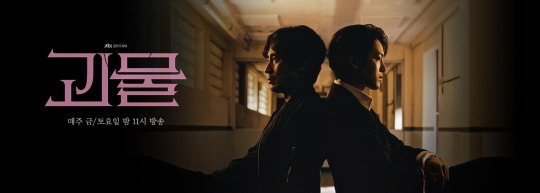
The drama begins in the spirit of the classic detective story. A young policeman, Han Joo Won, arrives in the small provincial town of Manyang, the place where a murder took place 20 years ago and remains unsolved. Han Joo Won is talented, educated and has connections at the very top - his father is deputy chief commissioner of police. Han Joo Won is also full of enthusiasm, bordering on obsession, to solve a case that his father never solved. According to the laws of the genre, we have a limited number of suspects connected by a long history of relationships, keeping their own and other people's secrets. And the biggest secret seems to be Han Joo Won's partner, police officer Lee Dong Sik. Twenty years ago, he was arrested on suspicion of the murder of his sister, but released for lack of evidence.
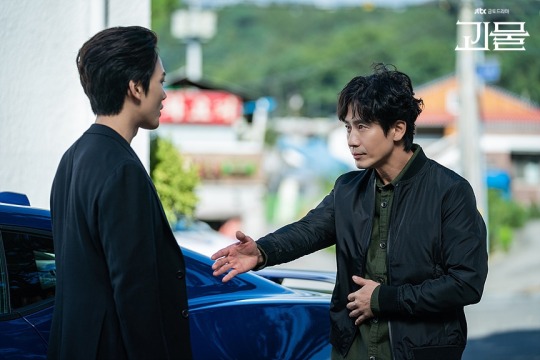
The plot of Beyond Evil is well twisted, and a new intrigue is revealed behind each denouement. But at the same time, already in the first episodes, I felt that Beyond Evil could be more than just a good detective. And I was not wrong.
From the very first episodes, we plunge into the drama, like into a fabulous whirlpool. We get to know the life of a provincial town. We watch Lee Dong Sik intently, trying to figure out what is behind his extravagant behavior. Shin Ha Kyun in this role masterfully balances on the border of light and shadow, sober calculation and madness. In the meantime, we are wondering who he is - a "fallen angel" or a bright angel who fell from a height and broke his wings. We look into the faces of all the heroes, trying to determine which of them is the monster. And gradually we are imbued with the mesmerizing beauty of this world and its inhabitants.
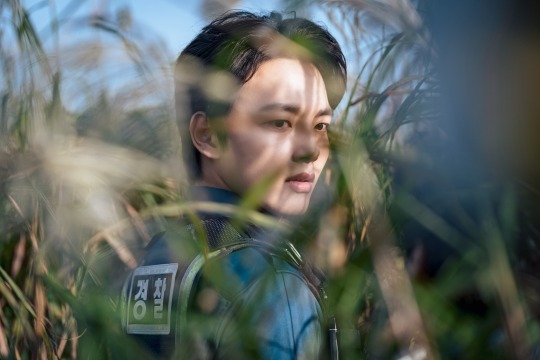
At first, Han Joo Won was perceived as an outsider. "Young master" in an expensive suit, completely alien among the ordinary people of Manyang. And it's not just about social status. Han Joo Won chose this role for himself - an independent observer who looks from above at the ugliness of this world and does not touch the dirt. However, the further he progresses in his research, the more personal it becomes, and the mask of equanimity slips from his face. This is how a classic detective story turns into a psychological journey - to feelings and memories walled up in the basements of the soul, into a journey to someone else and to oneself. Because these two processes always go together - to find yourself, you need to see the other and be seen. Find your own reflection in the other person's eyes.
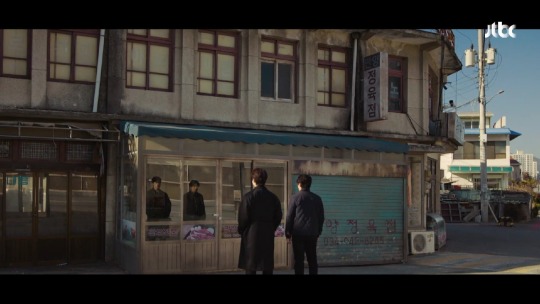
The drama Beyond Evil is a real maze of reflections. Each significant event, the history of each hero has its own reflection. Some of them are false, some of them are true, but all these fragments, put together, allow you to see the truth. There is such a method of image restoration - from several dull and even distorted reflections, you can recreate a real image. We recognize heroes by the way they are reflected in each other. And each new meeting, each new dialogue is another step towards finding a real face. This approach makes the image of each character multidimensional and deep.
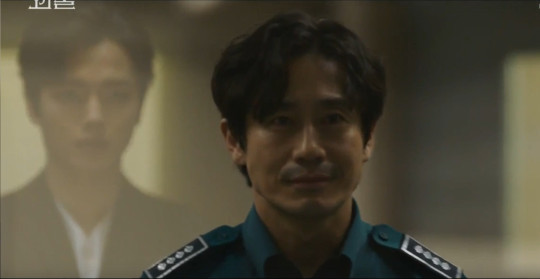
The drama really captures all aspects of the relationship. Family relationships – healthy or toxic. Relations with oneself, relationships with the world, social relationships - the law and its implementation. Morality as the ability to contact. Breaking up relationships like disappearing. The attitude towards the deceased loved ones and the ways of dealing with loss, with death. Relationships are alive, supportive and healing. Relationships are codependent, burdensome and suffocating. Personality always lives in a relationship. Fencing off from the world, a person cuts off a part of himself and, ultimately, can completely die as a person. This is how a person turns into a monster.
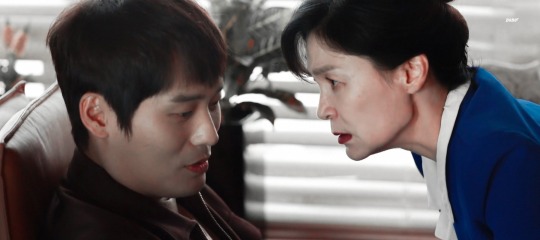
“Everyone in the city is like one family,” says Han Joo Won of the residents of Manyang. And he is absolutely right. All heroes are connected to each other by a whole network of threads. But somewhere these are the supporting threads of life, and somewhere they are suffocating fetters. The family image is central to the drama. Everything begins with it - everything ends with it. For each of the heroes, this word means something different - a project, a burden, a duty, a dream of absolute happiness. But for everyone, it carries a lot of weight. Thus, a small town turns out to be a global metaphor for a community, a social family, in which our humanity is born, but sometimes dies.
The density of connections and meanings in the drama is so great that not only each character, but the whole world of the drama is felt as something living, animated. The city of Manyang is not just a place of action, but an independent character. The whole city, as an integral living system, exists according to its own laws. The Beyond Evil story is the story of Manyang's illness and healing.
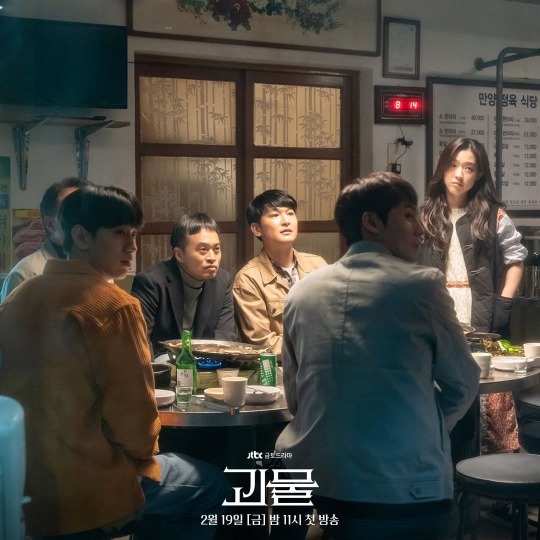
What's also great about the Beyond Evil is that there is no moralizing in it. Despite the great semantic load, the author does not reduce everything to one idea, does not teach, but shows reality in its complexity, even paradoxicality. Each character is a part of a big picture, an element of the inner life of an integral system. But also everyone is a separate unique person, with their own choice and responsibility for this choice. The story of the Beyond Evil is the story of Manyang, but it’s just as much the story of two people meeting. It is no coincidence that all the main scenes are "doubled". If you look at the titles of the episodes, you can see that the pairing is "sewn" into the very structure of the script. As if the whole story is a long dialogue between two, a series of questions and answers. Each character in the drama is interesting. Each has its own story, its own drama, its own unique personality. But the main axis of the whole story is the meeting and dialogue of the two main characters.
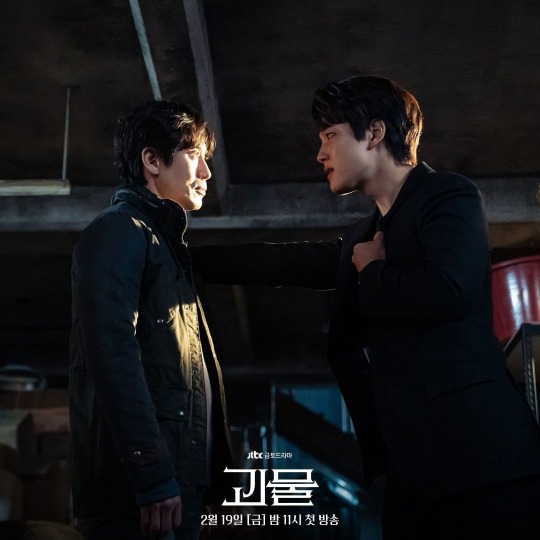
Lee Dong Sik and Han Joo Won, so different, but equally extraordinary, strong in spirit, but practically buried under the rubble of their own psychological trauma. Throughout the drama, they continually drift apart and collide, let go and catch each other, meeting again each time on a deeper level. They go a long way from mutual irritation, exploitation, projecting their fears and expectations onto each other, to true mutual understanding. Throughout the entire drama, the characters stare at each other - with suspicion, with rage, with interest, admiration, tenderness. But invariably - with intense attention, as if looking for something very important in each other's eyes. And in the end they find and return to each other the opportunity to be themselves - whole, feeling, alive.
In my opinion, Beyond Evil, like no other drama, showed us an example of perfect human contact. At that difficultly attainable level, when you see and accept another as he is, in his true essence. The bromance of the main characters of the Beyond Evil is so beautiful that it overshadowed all the drama love lines for me. In fact, this is a "love story" - like the love of one soul for another soul. Someone sees them as a mentor and student. Someone sees them as father and son or even as a couple in love. In my opinion, we were specially shown these relations at such a level of generalization that each viewer is free to interpret them in his own way. For me, they are the embodiment of the idea of an existential meeting, beyond any categories.
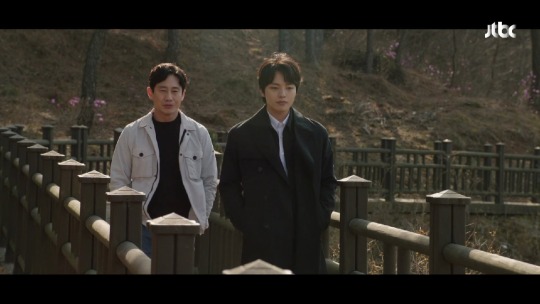
The Beyond Evil is a theatrical chamber drama. But this simplicity of the means has a deep meaning. The real challenge for an artist is to show everyday reality as something magical, wonderful, and sometimes monstrous. And the Beyond Evil succeeded to create a heroic epic in the scenery of a small provincial town, where a butcher's shop, the basement of an old house or a reed field feel like a mystical place. Where dramatic battles and wonderful metamorphoses take place in the dialogues between the characters. Magic is created in the Beyond Evil, not taking away from reality, but immersing it in it. This is the fantasy world that really exists - in the space of the human psyche, in relationships between people.
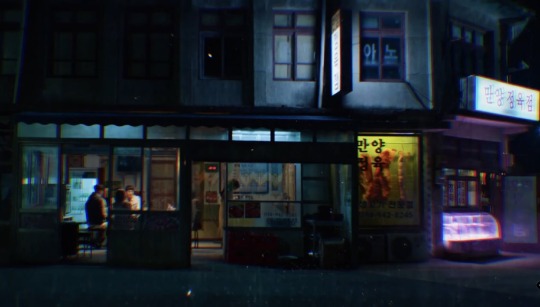
This is a huge burden on the actors. They don't just need to play their characters, the actors pretty much create the world and atmosphere of the drama. And they also need to show the development and even the rebirth of their characters. Many characters in the drama wear masks. But in the end all the masks will be removed, ripped off or washed away by the rain. And under someone's mask we will find a monstrous grin, and under someone's - a beautiful face. Shin Ha Kyun and Yeo Jin Goo play characters whose faces change throughout the drama. In each new episode, they experience new trials, different emotions, but their eyes express not only situational emotions, but also profound personality changes. In some scenes, they need to act so subtly that it is like walking on a tightrope. A slightly different expression - and the impression would be wrong. But the actors are perfect in every shot.
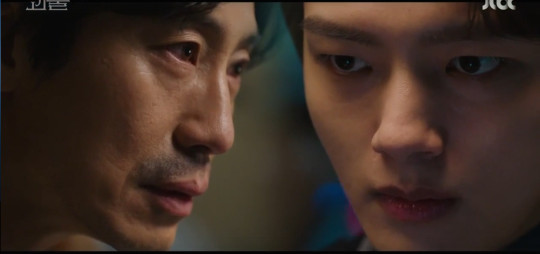
The talent of all the participants has created an amazing artistic world. It's like the famous Doctor Who machine - more inside than outside. And you can dive into this depth over and over again, finding new nuances and meanings.
237 notes
·
View notes
Note
The found family trope is so central to the serie, that I couldn't imagine Adrian's love story in any other way than confrontational in regard to the 11 st kids. They would be somewhat anxious of T return in Adrian's life considering her past + they would have adopted Augustine as an integral part of the team. (Furthermore if she looks so "nice")
Adrian is always looking for validation from them. Thus their opinion would be important for him. And it would clash with his core feelings, following what you started with the "Augustine is what a relationship should be, but Theodora is what feels good" trope.
I don't know, it would be interesting because this would actually offer some development into Adrian's psyche. I like that more than "perfect", love-at-first sight love stories. He's a messed up, complex character. Love's messy, too.
Thanks for indulging me. Can't wait to read your take - 👁️👄👁️
okay, no but this is pretty accurate. it honestly slipped my mind to add that into the story, so i will probably put some more tension between the group in the story. harcourt and chris are really prevalent in the end, as a way for augustine and adrian to address their feelings and such. (we will see in the next chapter that harcourt is very much a moral compass for harcourt and she trusts her opinion very much).
as for what augustine’s hiding, i think your line of thinking is much better than mine 😭 mine was definitely tamer (but it also adds to T’s mania because it’s not that big of a deal… but she will make it one.) idk, maybe i’ll tweak that aspect as well. we will see .
i’m more than happy to endulge any and all of your thoughts! doesn’t even have to be about dirty valentine, any adrian/peacemaker thoughts i’m more than ears for! (i have read literally every adrian chase fic on the internet so i’m bored in between new fics being uploaded + in between me writing) <333
#👁👄👁 anon#adrian chase#tasmpeter asks#adrian chase x reader#peacemaker#adrian chase x female reader#vigilante#freddie stroma#vigilante x reader#peacemaker hbo max
3 notes
·
View notes
Text
Looking for a trans character-centric webcomic?
That has both transfeminine and transmasculine primary characters? (and created by trans people)
Body and sex positivity? Aro/ace representation?
Autistic representation? Positive depictions of polyamory, including negotiations?
Representation of cultures with different concepts of gender identity?
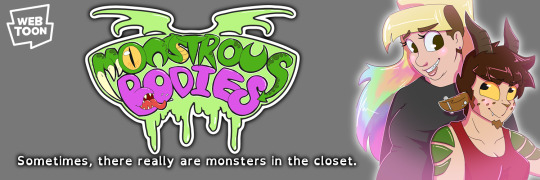
Well, I was. So I made Monstrous Bodies.
“A city of monsters. A handsome stranger. A new life. Monstrous Bodies is a tale of the intersections of transgender self-discovery and happiness, with a motley cast of creatures in a modern fantasy world. Sometimes, there really are monsters in the closet.”
The world is full of monster people, from centaurs and slimes to mimics and beastfolk. There are humans, too, but this isn’t about them. Also there’s griffins.

This is the webcomic that’s now my main creative project, which I’ve been working on for years now, which finally launched on Webtoon and Tapas in October 2020, and has recently completed Chapter 2 about 50 pages in.
This is a heavily character-focused comic with a wide and varied supporting cast, focusing on developing interpersonal relationships and their difficulties, especially when gender identity gets involved. There are episodic aspects, but this is still a narratively-driven story with a set goal.
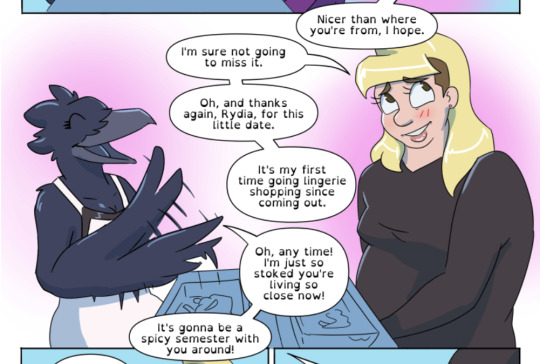
So who are our leads? Well, there’s Mimi the mimic, a trans woman who’s just moved from her more conservative hometown to the monster-friendly city of Drakeston. Growing up around humans can make life difficult when there’s a giant second mouth on your stomach, and she was often accused of “tricking” people into thinking she was a human like everyone else.
And there’s Tira the satyr, a rascally tomboy with a green dragon for a father... Clearly putting up a front about her toughness, what is it that Tira seems so guarded and avoidant about?... Well you might already have a good idea of that, since these characters have autobiographical shades of myself and my wife.
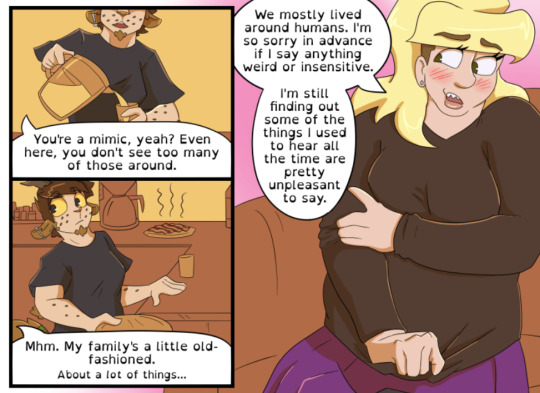
And of course, there’s a wide variety of supporting characters to befriend along the way. I love designing monster characters and species, and we’ve had so much fun developing their cultures and biology and building a world truly built for everyone. Drakeston is a recognizably modern city, of which their are far fewer in this world, though it is also a historical city where important peace treaties between different monsters and humans were written.
The main story is a little more focused in on Tira and Mimi, though we are always looking for ways to incorporate larger-scale worldbuilding, and to develop our many supporting characters. There will very probably be some mini-stories bringing them into the spotlight as we get deeper into things.
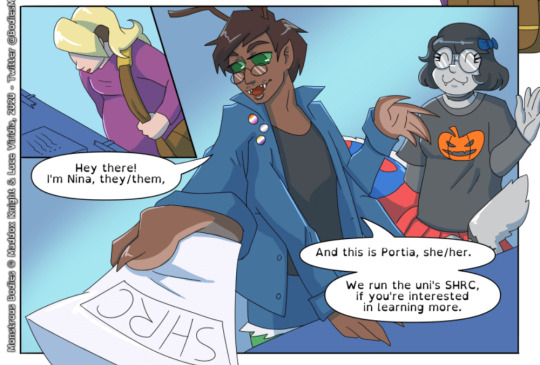
Things start out inevitably a bit standard with the setup in Chapter 1, I might be a lifelong writer but I can’t reinvent the wheel over here. The meat of Monstrous Bodies is rooted in deep conversations on a number of subjects related to love, gender, attraction, relationships, and so on.
I wanted to make a story that can be frank and textual about its queerness and other elements such as polyamory, that are relevant to the central plot and characters.

This is also a comic that discusses some elements of kink as Chapter 2 finds our leads visiting an exhibition. That being said, this is not intended as an explicit or strictly 18+ series, and our approach to this is light and mainly about the social and communication aspect.
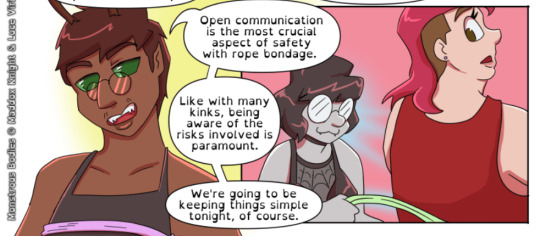
All that aside, we’re only 2 chapters in of what should be around 13 chapters for Book One, and the story is going to really start heating up now. Chapters 3 and 4 are both ones I’m looking forward to sharing like crazy. If any of this sounds like something you need in your life, we’re currently hosted on the site/ app Webtoon, and also the site/app Tapas, and we would also greatly appreciate your help in sharing this project around with reblogs and work of mouth and all that, or doing interactive things on those sites like hearts/ratings/comments and all that to try and boost our visibility. It’s a goal of mine to eventually bring this story to print, which is why the pages are structured like real comic pages and not the webtoon completely vertical style.
We’re a tiny project, with me doing all the art and comicking and all that, and my wife helping with the story and scripting. We just hit 1.5k views on Webtoon which I’m psyched about, but I would like to continue growing our audience. Right now we’re in the middle of a slight break in production on Chapter 3 for personal reasons, so it’s a great time to get caught up on what we have so far!
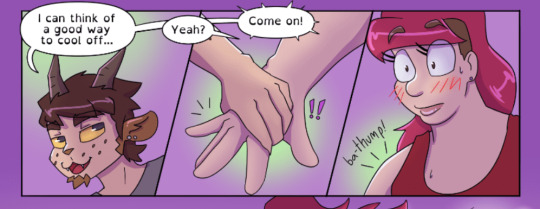
Read Monstrous Bodies on Webtoon!
Read Monstrous Bodies on Tapas!
17 notes
·
View notes
Text
AO3 Tag Game
tagged by @sleepy-skittles
1. How many works do you have on ao3?
224.
2. What’s your current AO3 wordcount?
1,170,582
3. How many fandoms have you written for and what are they?
I have 50 fandoms on my AO3, I’m not listing them all. Top ten are Raven Cycle, Criminal Minds, Warehouse 13, SG-1, Psych, DS9, SGA, AOS, the Middleman, and The 100.
4. What are your top 5 fics by kudos?
while we’re on the subject, could we change the subject now
Word on the Street
faith, hope, all that bullshit
It Had To Be You
see you somewhere, someplace, sometime
5. Do you respond to comments? Why or why not.
Qualified yes. If a comment is short or nonspecific, I probably won’t respond, not because I don’t appreciate those, I do! But they generally don’t make me feel like I have anything to say, so at a certain point it feels like “thank you for thanking me” silliness. I also don’t respond to anonymous/unlogged in comments because I figure the commenter isn’t going to see the response anyway.
Aside from that, I have the intention of responding to comments and it kinda...depends...on time and energy and mental reserves. I’ve been real bad at it this last year, that’s not my intention but it is the situation.
6. What’s the fic you’ve written with the angstiest ending?
don’t think about how much it will hurt, it’s essentially about the failure of denial as a long-term coping mechanism
7. Do you write crossovers? What’s the craziest one you’ve ever written?
I have written crossovers in the past, and there was a period of time where I wrote a lot of them (at least as an overall percentage of my output). I don’t really feel that itch anymore, lately. I once wrote a Stargate Atlantis/BBC Merlin crossover for a friend on Livejournal, that’s probably the one that required the largest suspension of disbelief.
8. Have you ever received hate on a fic?
Not really, no? I got an anon comment on a fic once that the way I had written Blue was “abusive” and telling me I “wasn’t feminist,” which I didn’t think were accurate critiques of the work but especially not if the person couldn’t be assed to put their own name to it.
The other thing I’ve gotten that is mostly irritating is people telling me that major, central aspects of the story didn’t work. Which, what...do you think...you are accomplishing with this. I’m not rewriting a several thousand word long story that’s been done for weeks because you think the plot twist was too obvious or the main character was mean. Deal with it on your own time.
9. Do you write smut?
Never used to but that is where we are now, yes!
10. Have you ever had a fic stolen?
Yup, someone copied Word on the Street, did a find and replace on the character names for some fandom I’d never heard of, and posted it to AO3. (I was amused to see they did, at least, do enough work to take out the comment about Adam’s father giving him a concussion, I suppose that wasn’t in keeping with the new character.) They were apparently known in their fandom for stealing works and so when they posted a new fic someone googled it, found my original, and left me a comment. I got in touch with AO3 and they pulled it pretty much right away.
11. Have you ever co-written a fic before?
Yes, Wrap My Flesh in Ivy and in Twine by @comicsohwhyohwhy! It is definitely different from writing on my own but I had a ton of fun and we’re hoping to cowrite again soon.
12. What’s your all time favorite ship?
I suppose at this point I have to say Adam/Ronan. For writing, for sure; since I don’t read a ton in this fandom there’s maybe room for “what’s my favorite ship to read” but at that point my history as a multi-fannish multi-shipper gets in my way.
13. What was the first fandom you wrote for?
Tsubasa: Reservoir Chronicles.
14. What’s your favorite fic you’ve written?
god this is always the most impossible question. I’m trying to frame it as like “what fics do I get inordinately happy about getting comments on” to see if that helps.
Age and Treachery for Tortall
The Visit for DS9
The Quintuple Convergence Alternatives for The Middleman
Loose Lips Sink Ships for The 100
still can’t whittle it down for TRC, I’m going to go with my cop out answer, new worlds for the weary, new lands for the living (not that it’s not true just I feel like I’ve talked a lot about that one being Special)
tagging @saywhatjessie, @two-of-swords-621, @ponyregrets, @talldecafcappuccino, @philosophersandfools whoever else wants to play
19 notes
·
View notes
Text
David Annandale’s The Harrowing Of Doom: An In-Depth Review
So, I was kindly offered an advance reviewer’s copy of The Harrowing of Doom by David Annandale for the Marvel Untold series, a new prose line revolving around Marvel’s villains. Although I’m not personally familiar, the author’s prior written work and academic scholarship indicated a strong background in fantasy, science fiction, as well as horror film and literature - all essential elements of Doom himself honestly, whether in his character, design, or formative influences. A promising start from the outset!
To no one’s surprise, I was especially excited for this one. Doctor Doom is both my favorite Marvel character and area of nerdy comics expertise, and Annandale sounded like the perfect candidate to tackle him.
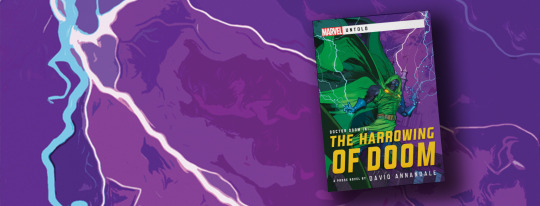
The Harrowing of Doom centers around a conflict familiar to those who know the character. Taking place fifteen years after his ascension to the throne, Victor von Doom is still hellbent on rescuing the soul of his mother, Cynthia, trapped in hell by the demon Mephisto. His yearly attempts to save her have been fruitless thus far, but he believes he can really do it this time, enlisting the help of a new character, Maria von Helm, and some of his lesser known subjects (also new characters) to accomplish the task, by building a machine called The Harrower. The noble scheme is further complicated by the reappearance of Prince Rudolfo Fortunov, son of the monarch deposed and murdered by Doom years prior, who is equally determined to take back what he believes is his birthright by any means necessary. The novel is a relatively dense and detailed one, and as a true blue Doom enthusiast, I have a dense and detailed review to match.
The first thing that I personally take note of in any material involving Doom is the author’s perspective on the truth of Latveria’s “benevolent dictatorship.” It immediately speaks volumes about a writer’s perception of Doom’s accountability and sense of morality; it kind of ends up coloring his entire characterization. That being said, I was really pleased by the evenhandedness with which Annandale treats Doom’s Latveria and his influence upon his subjects. It slots in neatly with some of the greats, Lee & Kirby, Jonathan Hickman, Roger Stern, etc with the acknowledgement that Doom is indeed a despot with an iron fist and a will absolute, but one who cares for the wellbeing of his country. Through dialogue from his subjects like the skittish Father Grigori Zargo and diehard loyal Captain Kariana Verlak, the reader gets the sense that Doom’s rule may be the best leadership Latveria has ever known. (A brief aside: another great strength of The Harrowing of Doom that has to be mentioned is the fleshing out of these different original characters. Maria von Helm was a particularly welcome addition, as a close friend of Doom’s mother and a far more empathetic magic user compared to him.)
Verlak is openly married to Dr. Elsa Orloff, a trans woman and neurosurgeon of international renown. Both of them had experienced the Fortunov rule that predated Doom’s, with Orloff even having fled Fortunov’s Latveria when she first come out as transgender, in fear of his tyrannical rule and the dangerously transphobic legislature he enforced called “The Laws of the Person.” It is apparent that Doom exists in obvious juxtaposition to the prior ruler’s bigotry. Beyond the total erasure of all previous discrimination and state-enforced bigotry, he has Verlak appointed in a role of great prominence, gave Orloff the tools she needed to succeed in her field, and even shares an exchange with her where he remarks that he knows her from her publications in the Lancet Neurology and that he appreciates them for their “speculative” approach. In an excellent exchange between Father Zargo and the rebel Prince Fortunov, the priest, who is by far Doom’s number one fan, explains Doom’s mesmerizing hold on the populace and the benefits they reap from his rule, despite it being a despotic one:
“I’ll be explicit, all the same,” said Zargo. “Doom is a sun king, even more fully than Louis XIV ever was. Latveria is a world power. How? Because of Doom and only because of Doom. Latveria’s strength and its wealth come from his inventions. And the beams of his sun touch every citizen. Universal basic income, free healthcare, free schooling, free universities, free training to the highest level of your calling - all of these things flow from Doom.”
“Free?” Fortunov snarled.
“The price is obedience, yes,” said Zargo, “And yes, Doom is feared.” Zargo stopped himself from saying Vladimir was feared and hated. [...] “Even though Doom is feared, he also is Latveria in every sense that matters.”
What I really appreciated was the author’s ability to walk the tightrope of acknowledging how beneficial Doom is for the country and his protectiveness over his domain, whilst also acknowledging Doom’s intense paternalism that ultimately favors his own goals. Doom, as well-read comic fans would know, is heralded as one of Marvel’s master manipulators. It’s a great strength of this novel to see him exerting his willpower and the strength of his personality to manipulate and sometimes, fully overpower that of his subjects. Father Zargo is definitely the most profound victim of this, a man with ties to both the church and the occult. Through the novel, Doom insistently pushes him towards the latter, his priorities made clear in one sentence: “The work was what mattered. Zargo’s soul was not Doom’s concern.” An especially interesting scene occurs later in the novel. Without too much elaboration, Doom performs an experiment where he uses the old Latverian nobility as guinea pigs. This was something I immensely liked, corroborating one of my own personal perceptions of Doom. It’s always made sense to me that Doom would continue to hold a certain amount of disdain for Latverian high society, even after he went from low class Romani boy to monarch himself.
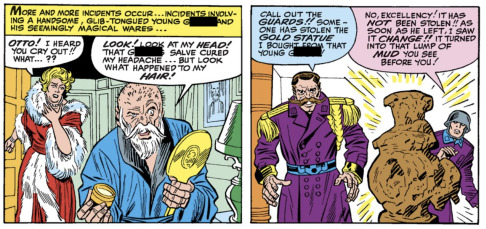

(“The Fantastic Origin of Doctor Doom,” Fantastic Four Annual #2.)
Afterwards his partner, Maria von Helm, muses aloud that she always wondered why Doom let vestiges of the old regime remain, to which Doom responds: “Now you know. The aristocracy has its uses, and the advantages of being disposable.” It’s maybe my favorite example in the book of the exceptions to Doom’s purported benevolence. He does want the country to flourish and for his subjects to prosper, but this intent can be superseded by his innately ambitious nature and his own personal biases. It’s clear at several points in the book that Annandale is obviously well-read on Doom himself, but it was especially in the capturing of this nuance that it really stuck out to me in a big way. (As well as the fun reference to Doom’s brief jaunt in the French Riviera in Supervillain Team-Up!)
Outside of this core aspect of his characterization, I really enjoyed how the novel not only built up Doom’s cult of personality, but emphasized the sheer magnetism of Doom himself, in person. Constantly, characters find themselves buffeted by strength of his will, craving his approval or cowering and scrambling to avoid his displeasure. It’s a great true-to-character depiction of interactions between Doom and Latverian citizens, dynamics that were only touched upon briefly in the periphery of most comics involving Doom. I think, ironically, this is also perhaps the source of one of the novel’s few weaknesses. By keeping the book very Latveria-focused, Annandale does an excellent job of adding world-building on every level, from expounding on Latverian national holidays to the layouts of Doomstadt to the country’s storied history with witches predating Doom and his mother. But the fact that Doom mostly interacts with those beneath him or those who work for him gives the reader a bit of a myopic, overtly flattering perspective of him as almost too certain, too powerful, too unfeeling. I suppose it serves the scope of the novel for Doom to be more an obelisk of a man than fully well-rounded, but I contest that one of the best things about his character is that his indomitable exterior hides a deep well of pain and uncertainty.

(“In The Clutches of Doctor Doom,” Fantastic Four #17.)
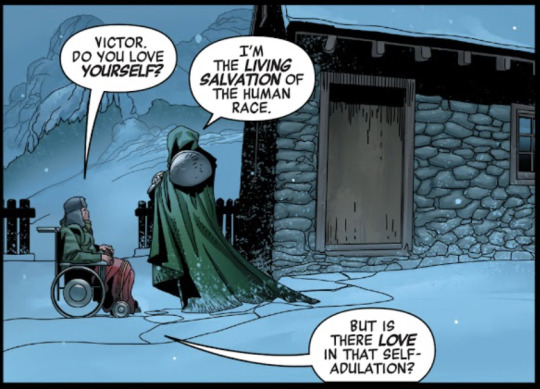
(“Oath of Fealty,” Doctor Doom #7.)
The novel obviously perceives Doom as Byronic, there’s even excerpts from Manfred interspersed between chapters that I greatly enjoyed, but I did find the heart of the Byronic character a little lacking here. Where Manfred bares his soul alone in monologue or to others, Doom, for the most part, does not. There are definitely brief allusions to the trials he’s faced, but he seems rarely prone to doubt or vulnerability until the very end. (For example, the central task is the attempt to rescue Cynthia von Doom’s soul, but little time is spent dwelling on this very human connection between mother and son.) Or even self-admitted imperfection! Interestingly, I only ever caught one mention of his scars in the entire novel.
The Harrowing of Doom seems to prescribe to the line of thought that the mask is the only true face of Doom’s that matters, but I think with that philosophy, it stays firmly within the character’s own comfort zone. And his psyche never feels truly challenged, because there’s no worthy challenger. Doom knows without a doubt that he is Fortunov’s superior, so there’s no real interpersonal friction there. It left me keenly interested in seeing how the author would write Doom in the presence of someone like Reed Richards, an opponent who has historically brought out Doom’s baser instincts and invoked his self-doubt, drawing out his flaws and humanity in the process. Hopefully Marvel approves a sequel!
Doubtlessly, it’s still a strong entry into Marvel’s Doom canon and an excellent read for anyone who enjoys the character and is familiar with his history. The novel gives a sprawling, detailed look at Latveria and fleshes out both country and countrymen with aplomb. I took real delight at the indirect peeks at Doom’s personality through other characters’s observations or simple exposition. Some notable examples include Doom’s occult librarian wondering if he had been appointed out of spite of his witch-hunter ancestry, Zargo noting the west wing of Werner Academy was dedicated to clinical research in a nod to Werner von Doom’s work as a healer, and my favorite: the paintings within Castle Doom being impressionistic depictions of Doom’s ancestors, “people long buried, long forgotten, and in their lifetimes ignored or worse.”
The conflict also moves at an engaging, brisk pace and smartly takes advantage of the widely known fact that Doom is preoccupied every Midsummer Night and turns that into an opening to be exploited by Fortunov, who also is well characterized throughout the novel and even experiences his own personal growth.
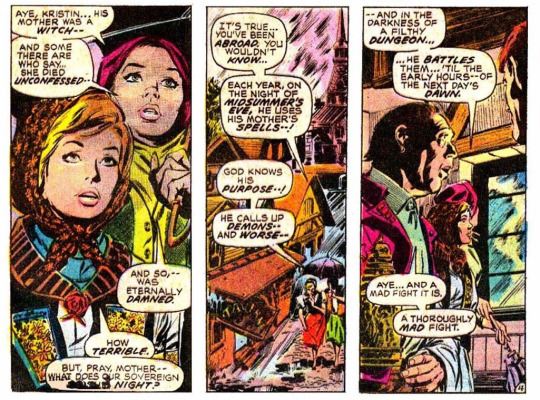
(“Though Some Call It Magic!”, Astonishing Tales #8)
Essentially, the product is a great novel about Doctor Doom influenced by strong comic lore knowledge, Gothic and Romance literature, horror cinema (According to the author, Doom’s lab is modeled after the lab from The Bride of Frankenstein!), and fantasy. If that sounds like something up your alley, definitely check it out. It gets a wholehearted recommendation from me.
About Marvel Entertainment
Marvel Entertainment, LLC, a wholly-owned subsidiary of The Walt Disney Company, is one of the world’s most prominent character-based entertainment companies, built on a proven library of more than 8,000 characters featured in a variety of media for over eighty years. Marvel utilizes its character franchises in entertainment, licensing, publishing, games, and digital media.
For more information visit marvel.com. © 2020 MARVEL
32 notes
·
View notes
Photo
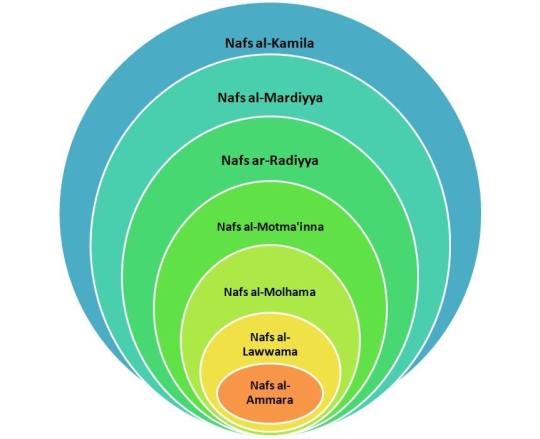
Sufi psychology Part 2 - Sufis and Human Energy centres.
1) Latifat-an-Nafsi (the Lower self): According to some, this Latifa-e-Nafsi is located slightly below the (Navel and is Yellow), for others, it is between the (Eyebrows and is Blue) and Its energies are increased by Meditation.
Nafs is usually translated as self or psyche. Its etymology is rooted in "breath" the basic visible process of breathing with energizing principle that confers existence to an individual human being. Some Sufis consider under the term "Nafs" the entirety of psychological processes, encompassing whole mental, emotional and volitional life.
However, the majority of Quranic-based Sufis are of the opinion that Nafs is a "lower", egotistical and passionate human nature which, along with Tab (literally, physical nature), comprises vegetative and animal aspects of human life. Synonyms for Nafs are devil, passion, greed, avarice, ego-centeredness etc.
The central aim of the Sufi path is transformation of Nafs (technical term is "Tazkiya-I-Nafs"' or "Purification of the soul'") from its deplorable state of ego-centredness through various psycho-spiritual stages to the purity and submission to the will of God. Ego may be assumed as an equivalent for Nafs in modern psychology.
Sufi orders have adopted convenient 7 maqāms or levels (maqāms are permanent stages on the voyage towards spiritual transformation), some still work with 3 levels or stages, at that stage one is a Wali -Saint.
The beginning of our entrance into the school of Sufism, we must learn about seven levels of being. These seven levels are like grades in any educational system which one must pass through in order to graduate. In our system, however, evaluations are made by a Higher Authority than the teacher.
Passing and failing grades are made known through real dreams, through the interpretation of which the teacher gives new responsibilities and duties to the seeker. But what is most important is that the seeker himself should be able to realize his own states so that he can live up to the next level to which he aspires.
Obviously, first it is necessary that he be conscious, aware of his character and actions, and be sincere in looking at himself. But it is also necessary to thoroughly know the characteristics of each level, especially the level in which he is presumed to be, and the next level, in which he hopes to be.
The Sufi's journey begins with;
1. Nafs al-Ammara (Inciting to evil self)
2. Nafs al Lawwamah (Reproachful self)
3. and ends in Nafs al Mulhimah (Inspired Self)
(at this stage one is a Wali -Saint) But others travel further some Sufis's final stage is Nafs al-Kamila-(The Perfect Self) also called Nafs Safiyah wal-kamilah (soul restful and perfected).
4. Nafs al Mutmainnah-(Tranquil Self)
5. Nafs ar Radiyyah-(Content Self)
6. Nafs al Mardiyyah-(Pleasing Self)
7. Nafs al-Kamila-(Perfect Self)
We should study the characteristics of the seven levels of being(Nafs) and try to see where we are. Hopefully this attempt will increase our efforts to reach the next highest level, and will make us careful not to revert to a lower level.
Man has two souls. One is called Ruhu Hayvani, the animal soul, and the other is Ruhu Insani, the human soul. The animal soul is a created, refined substance which controls life, mind, senses, feelings, emotions, will, and movement of the physical body. And our being, which relates to this animal soul, is called the “animal self,” the self ruled by the desires of our flesh or Nafsi Ammara, the evil commanding self which is the first and lowest of the seven levels of being.
Nafsi Ammara is a manifestation of the animal soul in man, while the six steps above the evil commanding ego are the development of the human soul, which is also called the Nafsi Natiqa, the being who can communicate with speech, or the Rational Being.
In a Nut Shell The next six levels are:
1. Nafsi Lawwama, when man hears the voice of his conscience and tries to resist his carnal desires;
2. Nafsi Mulhima, when man receives direct instructions through inspirations from his Lord;
3. Nafsi Mutmainna, when man is freed of self-indulgence and finds peace and tranquility in his state of piety and obedience to his Lord;
4. Nafsi Radiyya, when man accepts all that happens to him without any resentment or pain, and when good and bad become equal to him, and he is pleased with his lot;
5. Nafsi Mardiyya when man assumes the Divine Attributes, leaving his materiality, and
6. Nafsi Safiyya, when man reaches the purity of perfect harmony.
==========================
1- Nafsi Ammara
In this first level of the development of man, the rational self and human conscience have been defeated by lust and carnal desires. At this stage, our self does not recognize any rational or moral barriers to get what it wants.
It expresses itself in selfishness, arrogance, ambition, stinginess, envy, anger, cynicism, laziness and stupidity. Originally, nafs, ones self, identity, ones own personality and reality, is one of the Creator’s gifts to man.
But because we allow it to lean towards material values, to take pleasure only in worldly life, and because we succumb to fleshly lusts, it has turned ugly and become almost animal-like, while its shape remains that of a human being. It is a fauve camouflaged in the appearance of man, a mad wild animal which bites and claws itself as well as others.
This ego is our private devil, our worst enemy, who is living inside us, dominating and tyrannizing us and keeping our human soul imprisoned and forgotten in the depths of our subconscious.
If we are fortunate enough to be led by a guide to seek a better state, then the devil whispers in our ear: “What business do you have to be on this path? Don’t you see that everyone who was on this Path sooner or later died? All that remains of them is a few words. I know that you want the Truth, but where are the wise ones who would be able to teach you anything?
Show me a single saintly man who receives revelations, who can show miracles! They belonged to another time. Now is the time of facts, of science, of prosperity, and the good life. If you want to be religious – all right! Go to the mosque, pray, fast, and pray that the spirits of these holy men of the past help you, for there is no teacher alive worth your while!”
Thus the devil hides the truth. Kufr, infidelity, means covering, hiding in Arabic. Kafir, the infidel, means the one who hides something. The devil conceals the fact that at all times there are perfect men in the world and worthy teachers who can lead one to salvation.
But if the seeker pays any attention to the insinuations of the devil, he suffers doubt about his teacher, he is called away from the Path, his efforts are slowed down, and he will lend his ear to the whispers of the accursed devil again.
This time he will say, “Allah is forgiving, count on His Mercy; He does not dislike people who do things which He permits. Be kind to yourself and don’t tyrannize yourself. If you are kind towards your ego and give it things it wants, then it will obey you!”
If the seeker is fooled by these temptations, he will start having doubts; he will then be unclear as to whether things are lawful or unlawful, whether they are right or wrong.
When that happens, he is more likely to opt for the unlawful, since it is usually more pleasing to the senses. And the more his senses are satisfied, the more his heart will be blinded and hardened, and the more he will be led towards evil.
On the level of the evil commanding ego, all these influences are very heavy. To get out from under them, someone strong has to hold you by your hand and extricate you. It is very difficult if not impossible to do it by yourself.
But through Allah’s help, you may hear the voice of reason which says, “To do what Allah permits one to do out of His Mercy, instead of doing that which He orders us to do, is the profession of creatures who are lazy.”
For the true servants of Allah, it is an obligation to live according to the rules of Shariat and the ideals of the Tariqat.
And if we either follow this rational decision, which is an undeserved gift of Allah Most High, or we are rescued from our misery by a strong teacher, then we may rise to the second level of Nafsi Lawwama.
Thus the soul is pulled out from the dark dungeon of the ego to the light of conscience, and we will see our arrogance being transformed into humility, vengefulness and hate into love, anger into kindness, lust into chastity. . . If Allah so wills.
15 notes
·
View notes
Text
Disco Elysium Dialogue and Plot

Disco Elysium, today we will look at the writing and specifically dialogue of DE and how it builds the plot and shapes the experience of the player as they go through the game.
The game starts with quite literally nothing as the player character has blacked out and forgotten everything about themselves, where they are, and even the basics of the world they’re in. The game does take place in an alternate universe with major differences from our own both historically and physically and this is how the game introduces the player to it, by simply having the player take the role of someone without any knowledge of the world.
The game’s text choice dialogue is also augmented by what is perhaps one of the main unique mechanics of the game, the player’s inner voices/shards of their half remembered psyche.
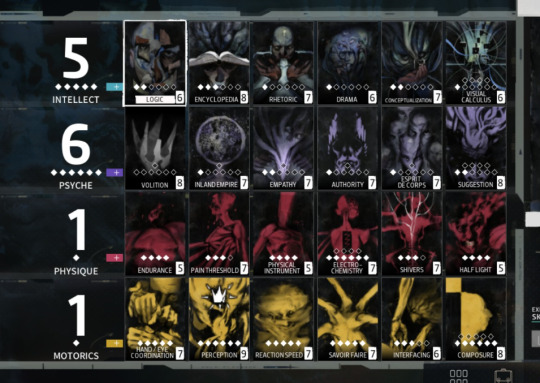
In the character’s conversation, their 24 disparate parts chime in to give information or opinions on current conversations and happenings, which each give glimpses of the player’s previous life. The insights to evidence point to their life and evident talent at detective work, and their moments of pure cunning that lead from them. The logic and encyclopedic knowledge that comes from a life of investigation and detective work. The physical ability from earlier work and apprehending criminals, the high that comes from drugs and alcohol. Each voice gives a look at a single facet of the player character’s whole mind. Additionally, these elements aren’t always working with your best interest in mind, they are fractures, not a complete whole of a psyche.
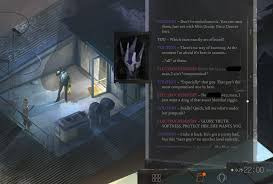
As seen with the above image, at one point the player is thoroughly attracted to another character they meet and one aspect points this out and how it compromises many of the player’s internal voices, the plot element of the player character falling for someone, is directly discussed and can be combated or leaned into through the player’s dialogue within their own head.
Another aspect is the player’s alcoholism and drug use, which can be combatted or can egg the player on into further drug and alcohol abuse.
As the player talks to others and with their own voices, they can also get and utilize specific thoughts in addition to the above inner voices.

These thoughts further shape the player’s interactions with the game, and if held onto for long enough, they can even impact what dialogue options are even available as the character you’re playing as ponders who they are and what their place in the world is.
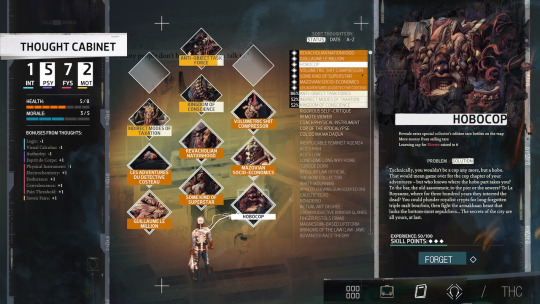
Each thought is an assumption the player character makes about themselves, the world, or other people and influences what options they have for interacting with it, as some lines of speech may occur to a Masovian Communist (discount name changed Marx) but not to a ultranationalist, and what politics your character supports may change what other characters think of you. For example, your inter-departmental partner, Kim Kitsuragi, will disapprove of the player for internalizing racist or ultranationalist thoughts, or others may embrace you for them, such as the Measurehead, a racial supremacist.

As the game is centrally about a mystery (and the main character is a detective sent to solve it) the entirety of the game builds out of the dialogue as the player talks to, gets clues and leads from, and interrogates various other characters about the situation they have found themselves in. And unrelated to the case, the extend of how much the player lets others know what they’ve forgotten also makes other characters less trusting or confident of/in you.
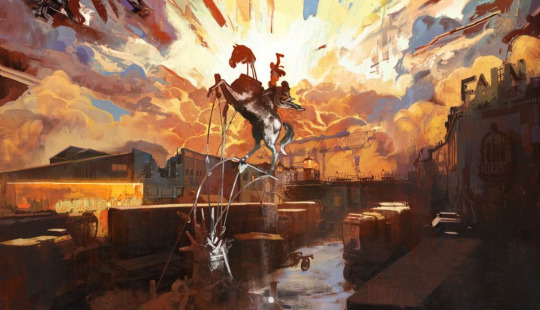
The dialogue of DE as the player’s main facet of influence over the game’s plot, with their voice, and their 24 hangers on, as well as their held thoughts and ideals. It really is another level of customization on top of just dialogue option that allows for different pressures to be placed on the player and plot.
2 notes
·
View notes
Note
Where do you think teen wolf jumped the shark? Also, non-specific, but do you have a favourite (and least favourite) TV finale? Thanks!
I heard a TV writer once discuss shark-jumping in terms of suspension of disbelief. “You get one buy,” is how he put it. On Psych, we’ll buy into the idea that Shawn does wacky hijinks in pursuit of convincing the police that he’s a psychic, because that is the show’s central premise. But if you try to add one more unbelievable thing on top of that (say, werewolves) the high-wire act fails. You’ve asked the audience to believe too many things, and now their faith in the show has collapsed.
But as even that writer acknowledged, it doesn’t usually work that cleanly. Shows rarely jump the shark all at once. Even seemingly obvious cases like, I don’t know, Bones, usually show some cracks in their foundations before they do whatever massive thing it is that completely fucks over their show. And often, it’s not a case of so much doing something that breaks the suspension of disbelief as it is breaking your contract with the audience. We agreed, implicitly, that we were going to be this kind of show—but now we’re this kind of show, instead.
The weird thing about that is that, in theory, that doesn’t have to be a bad thing. The Good Place broke its contract with its audience at the end of season one in a pretty major way: A lot of the twist of the first season of that show only works if you assume that it’s the kind of show that doesn’t have twists. (And despite it being one of the best first seasons of a comedy in years and years, I know people who felt betrayed by that twist!) Agents of SHIELD, as I wrote about earlier today, broke its contract with its audience massively at the end of its first season—it spent 18 episodes establishing a world, and character dynamics, and operating procedures, and then not gradually, but all at once, said, “Okay, none of that is what we’re doing anymore”—and became a much better show for it. Sometimes, you just have to say, “Screw the old world order,” and let people come along or not.
So anyway, when I ask, “When did Teen Wolf jump the shark?” I’m asking both, “When did it stop being the show it agreed to be at the outset?” and also, a little bit, “When did it get bad?” And there are two assumptions built into those questions: 1) That Teen Wolf at some point stopped being the show that viewers first signed on for, and 2) That Teen Wolf was ever good.
And, okay, I don’t think that Teen Wolf was a bad show, clearly, because I have watched seasons one through three… a lot. There is something compulsively watchable and fitfully well-observed, about that show. The scenes between Scott and his mom, or Stiles and his dad, or of just Allison, alone, are often shockingly well-observed on a human level. There is some great, almost melodic dialogue, performed by really good actors.
But also, I mean, it’s really silly. The first season is paced atrociously. There are all of these over-the-top cinematic sequences of lacrosse. The mythology is incoherent, even before they start piling stuff onto it. And it doesn’t seem to have a central theme until well into its third season, at which point its central theme is extremely ethically questionable.
But I think the thing is, that’s the show that viewers signed on for! They signed on for this silly, heartfelt, overly cinematic, occasionally weirdly insightful, sometimes very funny werewolf show, that couldn’t pace a 12-episode story arc to save its life. And there was no one moment where that show transitioned into being a different thing. It would be really easy to point to Allison’s death, but honestly, I think her death was fairly in keeping with the kind of show Teen Wolf had been up to that point; one thing that the show had always handled pretty well was teenage heartbreak, and although the ramifications of Allison’s death were handled weirdly, when they did pop up, they tended to be some of the better bits of late-season Teen Wolf.
I will say that season 3B was a huge tonal shift from previous seasons. It’s significantly darker than anything that came before it—not just at the end, but all the way through. It’s not really goofy the way that previous seasons were. On the other hand, 3B is a really good season of Teen Wolf. In many ways it’s the show firing at all cylinders. They’ve got their formula down. (Teen Wolf at its best is a villain + a secondary villain who’s hunting the main villain and making trouble for the good guys in the process + a handful of emotional throughlines.) They’ve got a genuine atmosphere going. They’ve got a tremendous central performance from Dylan O’Brien. And the plot completely tracks!
The problem is that 3B leads into season 4, which maintains the tonal shift—it is literally, physically darker, as all of the ensuing seasons are—but is also bad. There are moments of season 4 that I like, but it’s also the point in time when Teen Wolf gives up on the “two villains” model in favor of the “five hundred villains” model, and also introduces a bunch of new characters, which it is absolutely not capable of dealing with. Also, at around this point, Teen Wolf stopped plotting logically and started plotting thematically. What I mean is that, for instance, in season four, suddenly Lydia, Stiles, and Scott all have massive, encroaching financial issues. Of these, Stiles’ are the only ones that are connected to any previous plot point on the show itself. Lydia’s are, if I’m remembering correctly, introduced mid-season for like two episodes. But more to the point: These financial issues don’t go anywhere. There’s like a running bit with a duffel bag of money from the Hale vault, or whatever, but it’s ultimately meaningless, because the financial issues are not there to either move the plot forward or elucidate character. They’re supposed to be a thematic counterpoint to the hired assassins who have shown up in Beacon Hills.
That kind of theme-based plotting is a) not Teen Wolf, and b) completely outside of Teen Wolf’s skill set, and as soon as the show started working that way, it immediately became an incomprehensible mess. I reviewed every episode of season 5A, and I still could not tell you what the fuck was happening in that season.
But that can all be walked back. I’ve watched shows that got bad—sometimes in ways that made them feel completely unfamiliar to themselves—and then got good again. (For example, Community‘s season four finale is a shark-jumping moment if I’ve ever seen one, and season five, though it had Harmon back at the helm, still didn’t feel like Community in some vital way—but season six is my second-favorite season of the show, and keeps trying to sneak its way into being my favorite.) The moment that I think of as being the point of no return, for Teen Wolf, is when they wrote Kira off. When Allison died, at least it felt meaningful, and like it was part of the natural progression of the show saying something. When Derek and Isaac left, it was due to the actors understandably moving on, and came about in ways that felt like natural exit points for the characters. But Kira’s exit was just Teen Wolf flailing, getting rid of characters who felt like likeable, old-style Teen Wolf (and who the show had put three seasons of development into) while filling up the cast with a bunch of mostly bland next-generation people. After a season with no Danny and no Coach, writing Kira out was really Teen Wolf just intentionally burning its bridges.
And actually, if you go back, it all starts even earlier than 3B. I think the cracks in Teen Wolf’s foundation start in 3A (a season I’m generally fond of!) with the introduction of the capital-M Mythology: the True Alpha stuff, which ended up really fucking with its ethics and the way that Scott functioned on the show long-term; and also Lydia’s banshee stuff and the Nemeton stuff, which ended up just being incredibly confusing. Season 3B is remarkable, in hindsight, for how comparably well it deals with those elements, when they all ended up being a huge drag on the show, in the long run.
So my short answer is that Teen Wolf jumped the shark in season 4, but my longer answer is that it was a process, starting in season 3A, and not really ending until season 5.
My favorite TV finale is, I think, the Lost finale, although the Community finale is certainly high up there. (Controversial, I know, but I will stand by this opinion til the end of time.) My least favorite, though I know it’s practically a cliche, is the How I Met Your Mother finale. When my sister was helping me brainstorm to figure out my answer to this question, she noted that a unifying factor among many terrible series finales is that they undo major aspects of the show that preceded them, and she is completely correct. This is the same reason that, even though it’s unusual for people to stay with their high school sweethearts, Harry/Ginny and Ron/Hermione had to be together in the Harry Potter epilogue; if you want to make that point, you had a whole series to make it. Trying to be clever and pull a fast one with the ending is just irritating.
Send me meta prompts to distract me from my migraine!
17 notes
·
View notes